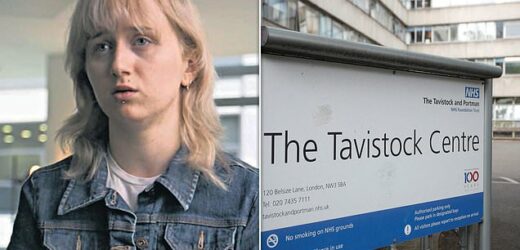‘I was referred to Tavistock trans clinic at age 15 – I feel like a mutilated experiment gone wrong’: Girl who detransitioned after deciding to identify as a boy and have a mastectomy blames professionals for letting her go ahead with it
- Tavistock patient Jasmine says her decision to transition to male was a ‘mistake’
- She says transitioning ‘made things worse’ and blames those who treated her
A girl who detransitioned after deciding to identify as a boy and undergoing a mastectomy at age 15 has blamed professionals for letting her go ahead with the procedure.
Jasmine, who was a patient at the controversial Tavistock transgender clinic, says her decision to transition to male was a ‘mistake’ and she now feels like a ‘mutilated experiment gone wrong’, The Telegraph reported.
She was reportedly referred to the London-based clinic by a trans charity and only saw professionals three times. Jasmine also claims she was referred to be prescribed cross-sex hormones and put on the waiting list for a mastectomy after her second appointment.
Jasmine, who has spoken out as part of a new ITV documentary called The Clinic, is one of several people to criticise the Tavistock centre. An interim review carried out by paediatrician Dr Hilary Cass in July last year called the clinic’s model ‘unsustainable’.
A spokesperson with the Tavistock centre told the newspaper it is working with NHS England to provide a new model of care. MailOnline has approached the Tavistock centre for comment.
Jasmine, who was a patient at the controversial Tavistock transgender clinic, says her decision to transition to male was a ‘mistake’ and she now feels like a ‘mutilated experiment gone wrong’
Jasmine said she first learned about the concept of transitioning on social media and – after watching videos of people documenting their journey – ‘wanted it so badly.’
Now she says transitioning ‘made things a lot worse’. She says it was partly a mistake she made ‘because I was a child’ but also somewhat the fault of the ‘various professionals that treated me.’
Jasmine claimed she took testosterone for over a year and her body now has ‘irreversible’ changes, including to her voice which is ‘significantly lower than it was before’.
She says she does not know what it’s like to have an adult’s body or how the treatments have ‘affected my fertility or my internal health’.
‘When I detransitioned, no one checked up on me,’ she reportedly told the documentary. ‘When I decided I was going to detransition, they discharged me.’
Jasmine claims the Tavistock centre told her she was ‘no longer a patient here’ and told her she would have to join a waiting list if she wanted to receive care again.
She added: ‘I kind of feel a little bit mutilated and like an experiment gone wrong walking through society sometimes.’
The Tavistock clinic is the only NHS gender identity service for youngsters in England and Wales. It is due to close in May 2024, to be replaced by two regional hubs in the north and south of the country.
Earlier this month, NHS England announced that puberty blockers will be given to adolescents suffering from gender dysphoria only as part of clinical research.
The NHS published its guidance for the new gender incongruence service for children and young people, which will replace the clinic at Tavistock and Portman NHS foundation trust in north London.
A spokesman in early June confirmed that children treated at the new gender clinics will not be routinely offered puberty blockers as part of their treatment, but said there could still be exceptional circumstances to that if a clinician makes the case that there are reasons why the child should have them.
Treatment being received by those attending the London Gids clinic will not change, he added.
The Tavistock clinic is the only NHS gender identity service for youngsters in England and Wales. It is due to close in May 2024, to be replaced by two regional hubs in the north and south of the country
The plans largely follow the interim review, include putting medical doctors in charge of physical treatments rather than therapists or psychologists.
It states that data and follow-ups after treatment will be collected on an on-going basis, with puberty blockers prescribed only as part of an NHS research programme.
The NHS also says social transitioning – the changing of clothing and pronouns to the opposite sex – should be led by the young person and their family, with input from clinicians.
In 2021/22 there were more than 5,000 referrals to the Tavistock, compared to just under 250 referrals in 2011/12.
The demographic also widely changed from birth-registered males to predominately female patients, many of whom also presented with ‘neurodiversity and other mental health needs and risky behaviours’.
Whistleblowers claimed clinicians at the Tavistock adopted differing approaches when prescribing puberty blockers, despite their long-term effects being poorly understood.
Meanwhile, there are more than 8,000 young people currently waiting for care.
The NHS has previously acknowledged there has been a ‘lack of clinical consensus and polarised opinion on what the best model of care for children and young people experiencing gender incongruence and dysphoria should be’.
The NHS said earlier this month that it aims to have a study started by next year on the impact of puberty blockers on gender dysphoria in children and young people with early-onset gender dysphoria.
Source: Read Full Article




